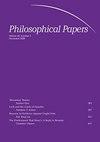沙发上的公民身份:新冠肺炎大流行及其后的公共参与和私人规范
IF 1.3
3区 哲学
0 PHILOSOPHY
引用次数: 0
摘要
摘要公共和私人领域之间的紧张关系并不是什么新鲜事:虽然女权主义者(以及其他人)长期以来一直呼吁将公共保护扩大到私人领域,但自由主义者认为有必要“保护“私人领域”免受公众侵犯”(Geuss 2001:114)。尽管我们承认这种区别的问题性质,但我们仍然认识到它在界定我们与谁交往以及因此我们欠他们什么方面的效用。传统上,公民身份,当被视为一种角色(而不是一种地位)时,属于公共领域。当我们走进投票站,当我们参加区议会会议,或写信给报纸时,我们就是公民。在家里,我们可能会想,我们不是公民,但在社会中,我们被剥夺了角色,我们在生活中扮演着最基本的角色——作为家人和朋友——有追求和表达自己兴趣和欲望的自由。那么,公民和个人,或者公共和私人,只有在被理解为在不同空间制定的情况下才能共存,每个空间都有自己的规范和规则。根据克里斯汀·霍布登对公民身份的描述,我们对公共公民和私人之间的这种明显分歧提出了质疑。新冠肺炎大流行迫使我们(从身体上)退回到私人领域,但社交媒体的兴起为我们提供了更多的机会来(虚拟地)应对公共挑战;本文通过霍布登对公民身份的描述来分析这一现实,探讨我们在社交媒体模糊的公私领域中的公民责任。我们研究了这种“坐在沙发上的公民身份”的一些含义,并提出,解决这些角色之间模糊界限的一个可能富有成效的方法是回到政治社会的基本面:社会契约——共同生活的项目。本文章由计算机程序翻译,如有差异,请以英文原文为准。
Citizenship from the Couch: Public Engagement and Private Norms in the COVID-19 Pandemic and Beyond
Abstract The tension between the public and the private spheres is not new: while feminists (among others) have long called for public protection to be extended to the private sphere, liberals argue for the need for the ‘defence of the “private sphere” from encroachment by the public’ (Geuss 2001: 114). Although we acknowledge the problematic nature of the distinction, we nevertheless recognize its utility in delineating who we are engaging with and what, therefore, we owe them. Traditionally, citizenship, when seen as a role (rather than a status), belongs to the public sphere. We are citizens when we walk into the voting booth, when we attend a ward council meeting, or write to the paper. At home, we might think, we are not citizens but, stripped of our roles in society, we assume the most fundamental roles in our lives—as family and friends—with freedom to pursue and express our interests and desires. It may appear then, that the citizen and the person, or the public and the private, co-exist only insofar as they are understood to be enacted in different spaces, each with their own norms and rules. Drawing upon Christine Hobden’s account of citizenship, we challenge this stark divide between the public citizen and private person. The COVID-19 pandemic has forced us to retreat (physically) to the private sphere, yet the rise of social media has provided us with greater opportunities to engage (virtually) with public challenges; this article analyses this reality through the lens of Hobden’s account of citizenship, exploring our civic responsibilities within the blurry public-private realm of social media. We examine some of the implications of this ‘citizenship from the couch’ and suggest that one possibly fruitful way to navigate the blurry line between these roles is to return to the fundamentals of political society: the social contract—the project of living together.
求助全文
通过发布文献求助,成功后即可免费获取论文全文。
去求助
来源期刊

Philosophical Papers
PHILOSOPHY-
CiteScore
2.10
自引率
0.00%
发文量
18
期刊介绍:
Philosophical Papers is an international, generalist journal of philosophy edited in South Africa Original Articles: Articles appearing in regular issues are original, high-quality, and stand-alone, and are written for the general professional philosopher. Submissions are welcome in any area of philosophy and undergo a process of peer review based on initial editor screening and refereeing by (usually) two referees. Special Issues: Topic-based special issues are comprised of both invited and submitted papers selected by guest editors. Recent special issues have included ''Philosophy''s Therapeutic Potential'' (2014, editor Dylan Futter); ''Aging and the Elderly'' (2012, editors Tom Martin and Samantha Vice); ''The Problem of the Criterion'' (2011, editor Mark Nelson); ''Retributive Emotions'' (2010, editor Lucy Allais); ‘Rape and its Meaning/s’ (2009, editor Louise du Toit). Calls for papers for upcoming special issues can be found here. Ideas for future special issues are welcome.
 求助内容:
求助内容: 应助结果提醒方式:
应助结果提醒方式:


